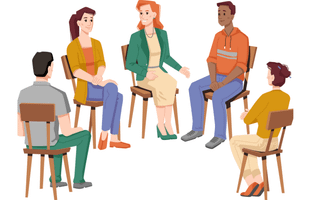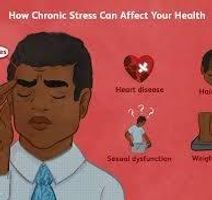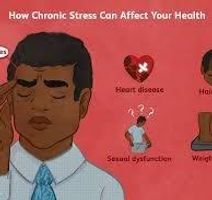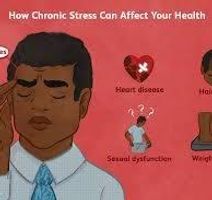
Introduction:
In today's fast-paced world, stress has become a common part of everyday life for many people. Understanding what stress is, recognizing its signs and symptoms, and learning effective prevention strategies are crucial for maintaining mental and physical well-being. In this blog post, we'll explore the concept of stress, its various manifestations, and practical tips for managing and preventing stress.
Body:
What is Stress?
Stress is the body's natural response to See More challenges or demands, whether physical, emotional, or psychological. It triggers a cascade of physiological changes, including the release of stress hormones like cortisol and adrenaline, preparing the body for the "fight or flight" response.
Signs and Symptoms of Stress:
Common signs and symptoms of stress can manifest in different ways, affecting both the mind and body. These may include:
Physical symptoms: Headaches, muscle tension, fatigue, digestive issues, and changes in sleep patterns.
Emotional symptoms: Anxiety, irritability, mood swings, feeling overwhelmed, and difficulty concentrating.
Behavioral symptoms: Increased or decreased appetite, social withdrawal, procrastination, and changes in productivity.
Prevention Strategies:
Preventing stress involves adopting healthy lifestyle habits and coping mechanisms to manage stressors effectively. Some prevention strategies include:
Practicing relaxation techniques such as deep breathing, meditation, or yoga.
Maintaining a balanced diet and staying hydrated.
Getting regular exercise to release tension and improve mood.
Setting realistic goals and priorities, and learning to say no when necessary.
Seeking social support from friends, family, or support groups.
Establishing healthy boundaries and practicing time management.
Conclusion:
By understanding the signs, symptoms, and prevention strategies related to stress, individuals can take proactive steps to manage their stress levels and enhance their overall well-being. Remember, it's essential to prioritize self-care and seek professional help if stress becomes overwhelming or chronic.
In today's fast-paced world, stress has become a common part of everyday life for many people. Understanding what stress is, recognizing its signs and symptoms, and learning effective prevention strategies are crucial for maintaining mental and physical well-being. In this blog post, we'll explore the concept of stress, its various manifestations, and practical tips for managing and preventing stress.
Body:
What is Stress?
Stress is the body's natural response to See More challenges or demands, whether physical, emotional, or psychological. It triggers a cascade of physiological changes, including the release of stress hormones like cortisol and adrenaline, preparing the body for the "fight or flight" response.
Signs and Symptoms of Stress:
Common signs and symptoms of stress can manifest in different ways, affecting both the mind and body. These may include:
Physical symptoms: Headaches, muscle tension, fatigue, digestive issues, and changes in sleep patterns.
Emotional symptoms: Anxiety, irritability, mood swings, feeling overwhelmed, and difficulty concentrating.
Behavioral symptoms: Increased or decreased appetite, social withdrawal, procrastination, and changes in productivity.
Prevention Strategies:
Preventing stress involves adopting healthy lifestyle habits and coping mechanisms to manage stressors effectively. Some prevention strategies include:
Practicing relaxation techniques such as deep breathing, meditation, or yoga.
Maintaining a balanced diet and staying hydrated.
Getting regular exercise to release tension and improve mood.
Setting realistic goals and priorities, and learning to say no when necessary.
Seeking social support from friends, family, or support groups.
Establishing healthy boundaries and practicing time management.
Conclusion:
By understanding the signs, symptoms, and prevention strategies related to stress, individuals can take proactive steps to manage their stress levels and enhance their overall well-being. Remember, it's essential to prioritize self-care and seek professional help if stress becomes overwhelming or chronic.
on March 08, 2024

on March 08, 2024

Introduction:
Navigating relationships can be challenging, but when a relationship becomes abusive, it can have devastating effects on one's mental, emotional, and physical well-being. In this blog post, we'll delve into the complexities of abusive relationships, how to recognize the signs, and steps to escape such harmful situations.
Body:
Understanding Abuse: Abuse can take various forms, including physical, emotional, verbal, sexual, and financial abuse. It's essential to recognize See More that abuse is not limited to physical violence; it can also involve manipulation, control, and coercion.
Recognizing the Signs: Some common signs of an abusive relationship include controlling behavior, constant criticism, isolation from friends and family, threats or intimidation, and physical violence. It's crucial to trust your instincts and seek help if you feel unsafe or uncomfortable in your relationship.
Seeking Support: If you're in an abusive relationship, know that you're not alone, and there are resources available to help you. Reach out to trusted friends, family members, or professionals such as counselors, therapists, or domestic violence hotlines for support and guidance.
Creating a Safety Plan: If you're planning to leave an abusive relationship, it's essential to have a safety plan in place. This may include documenting evidence of abuse, identifying safe places to go, and seeking legal protection if necessary.
Healing and Recovery: Leaving an abusive relationship is the first step towards healing and recovery. It's essential to prioritize self-care, seek therapy or counseling to process your experiences, and surround yourself with supportive and understanding individuals who can help you rebuild your life.
Conclusion:
Abusive relationships can have profound and long-lasting effects on individuals, but it's possible to break free and reclaim your life. By recognizing the signs of abuse, seeking support, and taking steps to prioritize your safety and well-being, you can begin the journey towards healing and rebuilding healthy relationships.
#Abusive Relationships, #Domestic Violence, #Recognizing Abuse, #Seeking Support
Navigating relationships can be challenging, but when a relationship becomes abusive, it can have devastating effects on one's mental, emotional, and physical well-being. In this blog post, we'll delve into the complexities of abusive relationships, how to recognize the signs, and steps to escape such harmful situations.
Body:
Understanding Abuse: Abuse can take various forms, including physical, emotional, verbal, sexual, and financial abuse. It's essential to recognize See More that abuse is not limited to physical violence; it can also involve manipulation, control, and coercion.
Recognizing the Signs: Some common signs of an abusive relationship include controlling behavior, constant criticism, isolation from friends and family, threats or intimidation, and physical violence. It's crucial to trust your instincts and seek help if you feel unsafe or uncomfortable in your relationship.
Seeking Support: If you're in an abusive relationship, know that you're not alone, and there are resources available to help you. Reach out to trusted friends, family members, or professionals such as counselors, therapists, or domestic violence hotlines for support and guidance.
Creating a Safety Plan: If you're planning to leave an abusive relationship, it's essential to have a safety plan in place. This may include documenting evidence of abuse, identifying safe places to go, and seeking legal protection if necessary.
Healing and Recovery: Leaving an abusive relationship is the first step towards healing and recovery. It's essential to prioritize self-care, seek therapy or counseling to process your experiences, and surround yourself with supportive and understanding individuals who can help you rebuild your life.
Conclusion:
Abusive relationships can have profound and long-lasting effects on individuals, but it's possible to break free and reclaim your life. By recognizing the signs of abuse, seeking support, and taking steps to prioritize your safety and well-being, you can begin the journey towards healing and rebuilding healthy relationships.
#Abusive Relationships, #Domestic Violence, #Recognizing Abuse, #Seeking Support
on March 07, 2024

on March 06, 2024

Elevating Mental Health: Exploring the Benefits of Group Therapy for Depression
https://lyfsmile.com/blog/group-therapy-for-depression/
Heading: Group Therapy for Depression: A Collaborative Path to Healing
In 2024, amidst the evolving landscape of mental health care, group therapy has emerged as a powerful and effective intervention for individuals struggling with depression. This therapeutic approach provides a supportive environment where individuals can connect, share experiences, See More and work together towards healing.
Heading: The Power of Connection and Support
Group therapy offers participants a sense of belonging and support that can be invaluable in navigating the challenges of depression. In a group setting, individuals can share their experiences, emotions, and coping strategies with others who understand and empathize with their struggles. This sense of connection can help reduce feelings of isolation and provide a source of comfort and validation.
Heading: Learning from Shared Experiences
One of the unique aspects of group therapy is the opportunity to learn from the experiences of others. Hearing how others have coped with similar challenges, overcome obstacles, and found hope can be incredibly empowering. Group members can offer insights, perspectives, and practical advice that may not be available in individual therapy sessions.
Heading: Building Coping Skills and Resilience
Group therapy provides a safe space for individuals to practice new coping skills and build resilience in the face of depression. Through guided exercises, role-playing, and group discussions, participants can learn effective strategies for managing symptoms, regulating emotions, and challenging negative thought patterns. Over time, these skills can empower individuals to take control of their mental health and lead more fulfilling lives.
Conclusion:
As we navigate the complexities of mental health in 2024, group therapy stands out as a beacon of hope and healing for those struggling with depression. By fostering connection, sharing experiences, and building coping skills, group therapy offers a collaborative path to recovery that can transform lives.
#Group Therapy, #Depression, #Mental Health, #Support, #Therapy, #Coping Strategies,
https://lyfsmile.com/blog/group-therapy-for-depression/
Heading: Group Therapy for Depression: A Collaborative Path to Healing
In 2024, amidst the evolving landscape of mental health care, group therapy has emerged as a powerful and effective intervention for individuals struggling with depression. This therapeutic approach provides a supportive environment where individuals can connect, share experiences, See More and work together towards healing.
Heading: The Power of Connection and Support
Group therapy offers participants a sense of belonging and support that can be invaluable in navigating the challenges of depression. In a group setting, individuals can share their experiences, emotions, and coping strategies with others who understand and empathize with their struggles. This sense of connection can help reduce feelings of isolation and provide a source of comfort and validation.
Heading: Learning from Shared Experiences
One of the unique aspects of group therapy is the opportunity to learn from the experiences of others. Hearing how others have coped with similar challenges, overcome obstacles, and found hope can be incredibly empowering. Group members can offer insights, perspectives, and practical advice that may not be available in individual therapy sessions.
Heading: Building Coping Skills and Resilience
Group therapy provides a safe space for individuals to practice new coping skills and build resilience in the face of depression. Through guided exercises, role-playing, and group discussions, participants can learn effective strategies for managing symptoms, regulating emotions, and challenging negative thought patterns. Over time, these skills can empower individuals to take control of their mental health and lead more fulfilling lives.
Conclusion:
As we navigate the complexities of mental health in 2024, group therapy stands out as a beacon of hope and healing for those struggling with depression. By fostering connection, sharing experiences, and building coping skills, group therapy offers a collaborative path to recovery that can transform lives.
#Group Therapy, #Depression, #Mental Health, #Support, #Therapy, #Coping Strategies,

Group therapy for depression: Transforming Lives Together
group therapy for depression offers an interesting & strong way to deal with mending. In this content piece you will dig into group of ideas
on March 04, 2024

Heading: Recognizing the Signs of Abuse in Relationships
In India, as in any society, it's essential to recognize the signs of abusive relationships to promote healing and empowerment. Here's a closer look at identifying and addressing abuse.
Heading: Types of Abuse in Indian Relationships
Abuse can manifest in various forms, including physical, emotional, verbal, sexual, and financial abuse. In Indian relationships, cultural factors and societal norms may exacerbate these forms See More of abuse, making it crucial to understand and address them effectively.
Heading: Seeking Support and Resources
If you or someone you know is experiencing abuse in a relationship, it's essential to seek support and access resources. Organizations and helplines across India offer assistance and guidance to survivors of abuse, helping them navigate their situations safely and confidentially.
Heading: Breaking the Cycle of Abuse
Breaking free from an abusive relationship requires courage and support. By reaching out for help, survivors can take steps toward healing, empowerment, and creating a life free from violence. Additionally, raising awareness about abusive relationships and advocating for change in societal attitudes can contribute to breaking the cycle of abuse.
Conclusion:
In India, as in any part of the world, addressing abusive relationships requires awareness, support, and action. By recognizing the signs of abuse, seeking support and resources, and advocating for change, individuals can work toward healing, empowerment, and creating a society free from violence.
#Abusive Relationships, #Domestic Violence, #India, Healing, #Empowerment, Support Resources, #Breaking the Cycle.
In India, as in any society, it's essential to recognize the signs of abusive relationships to promote healing and empowerment. Here's a closer look at identifying and addressing abuse.
Heading: Types of Abuse in Indian Relationships
Abuse can manifest in various forms, including physical, emotional, verbal, sexual, and financial abuse. In Indian relationships, cultural factors and societal norms may exacerbate these forms See More of abuse, making it crucial to understand and address them effectively.
Heading: Seeking Support and Resources
If you or someone you know is experiencing abuse in a relationship, it's essential to seek support and access resources. Organizations and helplines across India offer assistance and guidance to survivors of abuse, helping them navigate their situations safely and confidentially.
Heading: Breaking the Cycle of Abuse
Breaking free from an abusive relationship requires courage and support. By reaching out for help, survivors can take steps toward healing, empowerment, and creating a life free from violence. Additionally, raising awareness about abusive relationships and advocating for change in societal attitudes can contribute to breaking the cycle of abuse.
Conclusion:
In India, as in any part of the world, addressing abusive relationships requires awareness, support, and action. By recognizing the signs of abuse, seeking support and resources, and advocating for change, individuals can work toward healing, empowerment, and creating a society free from violence.
#Abusive Relationships, #Domestic Violence, #India, Healing, #Empowerment, Support Resources, #Breaking the Cycle.
on March 01, 2024

 1
1
on March 01, 2024

joeroot9220 created a page

Addressing Abusive Relationships in India: A Guide to Healing and Empowerment
on March 01, 2024

on February 27, 2024

on February 22, 2024








